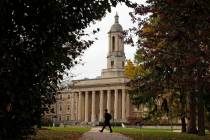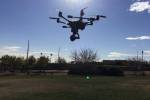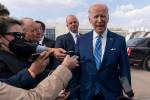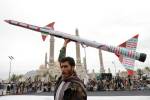EDITORIAL: Drone designation
The federal government picks winners and losers all the time. Mostly losers.
So when the federal government says you’re a winner, it’s a big deal. And Nevada, long accustomed to playing out the loser’s bracket thanks to Washington’s miserly management of millions of federal acres, finally was a huge winner last week.
The Federal Aviation Administration selected Nevada, Alaska, New York, Virginia, Texas and North Dakota as research and development bases for the emerging drone aircraft industry. Nevada already has a huge unmanned aerial vehicle presence, thanks to drone operations at Creech Air Force Base in Indian Springs, northwest of Las Vegas. But nonmilitary applications for UAVs are almost limitless, and the opportunity to refine that technology holds huge potential for commercial investment and private-sector job creation.
Steve Hill, executive director of the Governor’s Office of Economic Development, said Nevada’s selection is expected to lead to an annual economic impact of between $2.5 billion and $8 billion. Within a decade, that impact could approach $100 billion, with perhaps 15,000 good-paying jobs and thousands more positions in feeder industries. As reported Tuesday by the Review-Journal, the FAA is expected to issue commercial drone operating and licensing standards by September 2015. But the race to bring to market drones capable of complying with those rules has already started.
Nevada has been preparing for this opportunity by launching drone studies at UNLV and UNR. And Nevada’s sunny climate and open spaces will give researchers the opportunity to work every day of the year. But Mr. Hill is correct in pointing out that the federal designation, which awards no money to the six states chosen, is merely an opportunity.
“How do we proceed to capitalize on this? The jobs are very good jobs. The supply chain the industry needs for support can be in Nevada, but we have to earn that. It will be a competitive process with the other sites as well as other states,” he said.
Indeed, Nevada’s work is just beginning, and gaining the maximum economic benefits will require collaboration between education systems and the private sector. Congratulations and thanks to everyone involved in crafting and selling Nevada’s bid. Washington has provided Nevada with a much-needed chance to boost its fragile economy.
But this breathtaking power gives us pause. Why aren’t companies free to select research sites on their own? Why does the FAA get to decide which places are most suitable for drone research? Because the FAA says so, that’s why.
Nevada is a winner today. It could be a loser tomorrow. And if the federal government has the power to name Nevada a drone research hub, it has the power to take that designation away. The government of limited powers conceived by the Founding Fathers is long gone.























